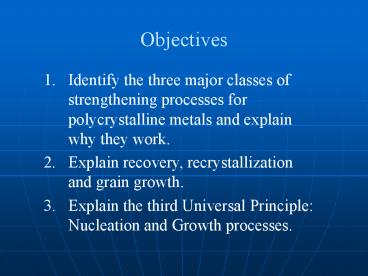Objectives PowerPoint PPT Presentation
1 / 30
Title: Objectives
1
Objectives
- Identify the three major classes of strengthening
processes for polycrystalline metals and explain
why they work. - Explain recovery, recrystallization and grain
growth. - Explain the third Universal Principle Nucleation
and Growth processes.
2
Elastic Deformation
- Stretching of molecular bonds
- Will be almost the same in tension as in
compression.
3
- Plastic Deformation Slip
4
Slip Happens on Slip Systems
- Close Packed Planes
- Close Packed Directions
5
Actual Yield
- Most Metals are
- Polycrystalline ?
- Neighbors Interfere!
- Sy Polycrystals gt Sy Monocrystals
6
Dislocations and Plasticity
- Deformation of pure crystals is greater than
expected based on number of pre-existing
dislocations. - Dislocations density increases during plastic
deformation. - Pre-existing dislocations do not move they are
pinned by atmospheres of impurities. - Conclusion Dislocations must be created!
7
Nucleation of Dislocations
- 1. Homogeneous
- Uniform conditions
- No Assistance
- just shear stress
8
Nucleation of Dislocations
2. Heterogeneous Non uniform conditions Assistan
ce by impurities or defects
?
?
9
Heterogeneous NucleationFrank-Reed Source
10
Dislocation Loop Frank Reed
11
Slip The Highway Analogy
- Slip systems are freeways for Dislocations.
12
Slip Highway Analogy
- Three Things Slow Traffic
- 1. Blocked Freeways (construction)
- 2. Too Many Cars
- 3. Pedestrians, Stopped Cars
13
- Traffic
- Blocked Freeways- Construction
Slip Grain Boundaries
14
Grain Boundaries
- 3 Dislocations
- 8 Dislocations
- Which is more difficult?
15
Yield Strength vs. Grain Size
16
- Traffic
- Too Many Cars
Slip Dislocation Density Called Work Hardening
or Strain Hardening
17
Yield Strength vs. Dislocation Density
18
- Traffic
- Pedestrians, Stopped Cars
Slip Impurities Alloying Elements Precipitates
19
Hardness of Steel vs. Interstitial Carbon Content
20
Ex Solid SolutionStrengthening in Copper
Adapted from Fig. 7.16 (a) and (b), Callister 7e.
Tensile strength yield strength increase with
wt Ni.
21
Reheating Plastically Deformed Metal
- Recovery elimination of dislocations
- Recrystallization formation of equiaxed new
grains between old grains. - Grain Growth equiaxed grains grow, absorbing
old distorted grains.
22
Effect of Heating After CW
Effects of cold work are reversed!
Adapted from Fig. 7.22, Callister 7e. (Fig. 7.22
is adapted from G. Sachs and K.R. van Horn,
Practical Metallurgy, Applied Metallurgy, and the
Industrial Processing of Ferrous and Nonferrous
Metals and Alloys, American Society for Metals,
1940, p. 139.)
23
Recovery
Annihilation reduces dislocation density.
24
Recrystallization
New grains are formed that -- have a
small dislocation density -- are small --
consume cold-worked grains.
Adapted from Fig. 7.21 (a),(b), Callister 7e.
(Fig. 7.21 (a),(b) are courtesy of J.E. Burke,
General Electric Company.)
25
Further Recrystallization
All cold-worked grains are consumed.
Adapted from Fig. 7.21 (c),(d), Callister 7e.
(Fig. 7.21 (c),(d) are courtesy of J.E. Burke,
General Electric Company.)
26
Grain Growth
At longer times, larger grains consume smaller
ones. Why?
Adapted from Fig. 7.21 (d),(e), Callister 7e.
(Fig. 7.21 (d),(e) are courtesy of J.E. Burke,
General Electric Company.)
27
Characteristic Strength Values
28
Nucleation and Growth
- Nucleation Processes
- Homogeneous (no assistance, high energy)
- Heterogeneous (assistance, low energy)
29
Nucleation and Growth
Will follow standard incubation/growth laws
30
Nucleation and Growth
Growth Processes Often diffusion or heat
flow limited Competes with further
nucleation

